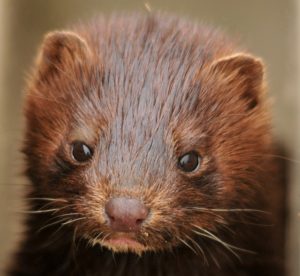Fish ponds are just as likely to attract wildlife as a natural pond. But, not all visitors to a fish pond are welcome. There are some visitors who are more obvious and easy to deter while others are so agile and sneaky their visits often go unnoticed with dire consequences.
Fish pond predators UK
- Mink – the American Mink is often mistaken for an Otto but are much smaller with fluffier tails and pointed snouts. They are not native to the UK and were bought across from America for the fur-farming industry in the 1920’s. The mink population reached peak numbers in the 1950’s with a record number of farms totalling around 400. By the end of 1967, wild mink were reported in more than 50% of our counties as a result of them escaping or being set free by protestors to the fur industry.As yet there is no strategy for managing the UK wild mink populations. This sweet looking creature is an indiscriminate killer of fish, birds and small mammals. They have no natural predators so the population numbers are thriving which is not good news for fish pond keepers that are neighbours to the country-side. Mink are nocturnal and move very swiftly so it is difficult to locate their presence. They are also good little swimmers and are strong enough to take fish bigger than they are. The little rascals will get under pond netting and are undeterred by steep edged pond designs.

- Herons – they are wading birds and mostly associated with wetlands. They prey on fish, frogs and invertebrates obtaining their food by wading through wetlands and visiting garden ponds. Herons are a common siting at the side of water where they stand on one leg with their heads hunched into the top of their wings. They are frequently seen along the side of the canals too (in fact where there are fisherman there are likely to be herons!). They pounce onto the unsuspecting victim in shallow water with their dagger like beaks. Once they have found a garden pond with a rich food source they are very persistent.
- Foxes, crows and cats are less likely to steal fish but if it is an easy meal – the threat of these animals is real.
How to stop a predator invasion
Fish pond design and size can make a big impact on keeping predators away, although it is not a full proof deterrent. Building a raised pond with vertical sides makes it more difficult for predators to ‘fish’ around for prey. Adding floating plants to your fish pond offers a place to hide when your fish feel threatened by unwanted visitors. A shallow pond with sloping sides makes it very easy for predators to gain access and to exit.
A pond guard or netting will keep foxes, cats, herons and crows from treating your pond like a sushi take-away. This will not deter the otto or mink, though as they can get under the netting.
If you reside near a lake or canal you are likely to see heron visiting your garden in the hope of grabbing easy pickings. Many fish pond owners invest in a heron decoy to put on the edge of their pond but this alone doesn’t always have a 100% success rate.
For the otto and American mink visitors, a 0.3 meter mesh fence or electric fence with absolutely no gaps is probably your best solution for ponds built at ground level. You only need to leave it up for about a month and they will soon learn that your pond is not open to visitors – ever!
A fifth deterrent worth trying at times when you feel your pond is under threat is to supply an alternative food source to draw predators away from your fish pond.
There is nothing more disheartening than our pond inhabitants losing their precious lives to the beaks, jaws and claws of hungry predators. There are certain loses that are at the mercy of nature and difficult to control such as that of dwindling tadpole numbers. However, with larger predators there is a greater chance of being able to put defences in place to deter them. The Grey Heron is probably our biggest threat to any pond owner, preying on fish and frogs. Predators to fish ponds tend to pray on easy pickings so if fish have a place to hide, they are less likely to invite attention. If the escape route out of a pond is a challenge it too would be a disincentive to predators. Be on the look out and keep your precious fish safe!
A box-welded pond liner for vertically sided fish ponds makes it more difficult for claws and beaks to come in contact and risk puncturing the liner – predators are also less likely to bother trying to prey on fish in a pond when access and exit are more of a challenge. Building a pergola over a raised pond is an added deterrent for birds whose flight will be obstructed by the pillars of the pergola.
Keeping a fish pond safe from predators is likely to require a bit of effort. However, if you do succeed in making it difficult for the predators to feast on your fish, frogs or tadpoles – the chances are they will leave to look for easier pickings elsewhere.





